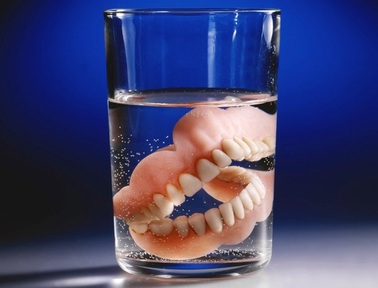Ageing population's dirty false teeth triggers global guidelines
Bleach, soap and water and toothpaste has for too long been used by elderly people to clean their false teeth, prompting academics to publish global guidelines to stop the rot from setting in.

'Frightening'
A global group of academics, including the Oral Health Foundation and King’s College London, launched new guidelines at the FDI World Dental Congress in Argentina, to stop the world’s elderly following ‘unreliable’ advice on how to keep their dentures clean.
The guidance is based on their report which revealed dentists and denture wearers received varied, ‘confusing and unreliable’ advice, and usually relied on personal experience.
Dr Nigel Carter, chief executive of the UK charity Oral Health Foundation which published the report, said: “We have found that people with dentures do not know how they should be cleaning them.
"Our report shows that denture wearers use everything from soap and water to toothpastes, bleaches and commercial products. But with the variety of recommendations available online and from other sources, it is no surprise that people are confused.
“The amount of inconsistent and often unproven advice about cleaning and maintaining dentures is frightening. Incorrect denture care can pose a real threat to both the oral health and general health of denture wearers."
Care workers advised to 'adopt guidelines'
The risks linked to dirty dentures include inflammation of the mouth, changes in taste, staining and bad breath.
It has also been linked to health problems such as pneumonia, especially in frail, older people but the demand for false teeth is expected to climb dramatically over the next 30 years as the elderly population increases. It is predicted that by 2050 an estimated two billion people will be aged 60+, more than double the current figure.
“We will now be working with the NHS, local authorities, dental practices and GPs to help adoption of these guidelines across the UK,” added Dr Carter.
“Unclean dentures can have serious consequences to health. Please adopt these guidelines, whether you wear dentures, are a carer to someone that does, or you have a family member that wears them.”
A spokesman for the Oral Health Foundation said: “After conducting a full review of scientific and evidence-based research, we found a severe lack of consistent recommendations on denture care and cleaning.
“Given the ageing population and the risks associated with poor denture care, we feel that publishing a global standard, will make it easier for millions of denture-wearers to receive the correct guidance.”
The findings of the report received an educational grant from GSK and featured a panel of independent, internationally-recognised experts from the Netherlands, Belgium, Switzerland, Japan and the UK.
New denture-friendly guidance:
The new denture-friendly guidelines recommend:
1. Brush your dentures daily: use a toothbrush or denture brush (with mechanical action) with a non-abrasive denture cleanser (not toothpaste).
2. Soak your dentures daily: in a denture-cleansing solution to remove more of the bad bacteria and disinfect your dentures. Denture-cleansing solutions should ONLY be used outside the mouth and denture wearers should strictly follow the manufacturers’ guidelines.
3. Take out your dentures at night: Unless there are reasons for leaving dentures in, taking them out overnight will help to relieve any soreness and prevent infection. This guideline is even more important for people at a higher risk of developing stomatitis and for frail or institutionalised older people. Soaking in a denture cleanser solution after mechanical cleaning seems to be beneficial for preventing denture stomatitis and the potential risk of pneumonia in elderly people.
4. Visit your dentist regularly: To make sure that dentures are being kept in good condition and the mouth is still healthy. All patients who wear removable dentures should be enrolled into a regular maintenance programme with their dentist.
For anyone, including care workers who are concerned about how to look after full dentures, contact the Oral Health Foundation’s Dental helpline for free advice on 01788 539780.
To read the Oral Health Foundation (2018) ‘White Paper on Optimal Care and Maintenance of Full Dentures for Oral and General Health’ click here.
Latest News
 29-Jul-24
Dementia Bus gives carehome.co.uk staff insight into life with dementia
29-Jul-24
Dementia Bus gives carehome.co.uk staff insight into life with dementia
 01-Mar-24
Find out the top care homes in 2024
01-Mar-24
Find out the top care homes in 2024
 21-Mar-23
UK's top care homes in 2023 revealed
21-Mar-23
UK's top care homes in 2023 revealed
 03-Jan-23
carehome.co.uk launches free care helpline
03-Jan-23
carehome.co.uk launches free care helpline
 13-Dec-22
5 mins with Emily Whitehurst, chief operating officer for Constantia Healthcare
13-Dec-22
5 mins with Emily Whitehurst, chief operating officer for Constantia Healthcare